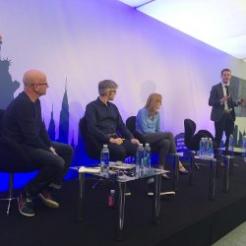Charities are increasingly embracing ‘hackathons’ as a way for technology experts to create and test a technological solution quickly, but are they just a fad or the future? Kirsty Weakley sat in on one to find out.
Last week I was invited to sit in on the brainstorming session for Hack for Homelessness, which was attempting to come up with a solution that would help homeless people get back on their feet. And then I attended the final X-Factor-style judging session to select the idea that would be taken forward.
Hackathons, also known as hack days, hackfests, codefests or data dives, are events that see people working in different areas of technology come together to create and test new software over the space of a few hours or days. And increasingly charities are benefiting from the trend.
Cancer Research UK’s game that analyses gene data came about as the result of a hackathon. And DataKind, an American charity that arranges hackathons that bring together tech experts and charities with specific needs, launched a UK chapter in 2013 and has run a number of events around the UK.
But are these isolated examples or will we see more charities getting involved in this kind of event?
The project I observed was arranged by advertising agency Mindshare UK with involvement from the Big Issue Foundation and St Mungo’s Broadway. Technology and media companies taking part included Google, Facebook, Bauer, News UK, Storm, H-art, TH_NK and Maido.
Inspired by the fact that homelessness is increasing and that 70 per cent of homeless people have a mobile phone, Mark Creighton, chief executive of Mindshare UK, said that the aim of the project was to come up with something that could “get people out of homelessness”.
“What this is not about is how can we make your life more comfortable on the street? A number of organisations already deal with that,” he added.
The process
On Monday lunchtime last week, around 20 people gathered at Mindshare’s offices in London to brainstorm ideas. They started with what was literally a blank slate and by the end of the first day had come up with 30 potential ideas.
Representatives from both charities were on hand to steer them in the right direction (and away from the wrong one – without their input the idea of a chat-roulette-style phone line could have got much further).
The next couple of days were about establishing the feasibility of those ideas and deciding which ones to take forward and create prototypes.
The pitches
After working through the night to build prototypes that could demonstrate how the ideas could come to life, the top three ideas were then presented at a session at the Advertising Week Europe conference. Here they are:
Three Steps
Team A suggested creating a platform to connect homeless people with members of the public. People would be able to list a job that needed doing, such as walking a dog or moving boxes, and homeless people would be able to text in to apply for it.
Donate Out-of-office
Team B’s idea was to turn out-of-office responses into a fundraising space. They suggested that the front cover of the latest issue of the Big Issue would automatically appear with the out-of-office message and a link would tell people where their nearest vendor is.
Out of Home
Team C wanted to turn roadside six-sheets (digital advertising panels, often found by the side of bus stops) into mobile phone charge points. St Mungo's Broadway would provide homeless people with a swipe card that would enable them to unlock a secure box to charge their mobile phones – meaning that they are able to stay connected to support and call for help if needed. Members of the public would also be able to donate to use the charge point and use it to find out about homelessness.
The judging
Playing the parts of Simon Cowell, Louis Walsh and Cheryl Fernandez-Versini were Rebecca Sycamore, director of fundraising and communications at St Mungo’s Broadway, Stephen Robertson, chief executive at the Big Issue Foundation and Paul Drake, director of D&AD.
Unlike on the X-Factor the judges’ comments were overwhelmingly positive.
Sycamore said that Team B’s suggestion was particularly exciting for fundraisers. “It’s easy to see how it could be adapted to other corporates wishing to support different causes,” she said. Robertson said of Team C’s suggestion that “it makes a really big noise – it will be interesting to see how it plays out”.
Just over 50 people voted at the end of the session and Team C won with almost half the vote while Team B came second with just over 40 per cent of the vote. Mindshare now aims to recruit partners to help turn six-sheet across London into charge points. So far out-of-home media partner Clear Channel UK has said it is willing to get involved in the project.
What did we learn?
What struck me was that the two pitches that were the most popular were those that were actually really simple ideas.
It’s easy to see why the tech experts like these events – they’re creative, adrenaline-fuelled and the intensity of the situation results in some really innovative thinking. It's also an excuse to stay up late and eat lots of junk food.
Where possible charities should embrace the trend and make the most of enthusiasm from the technology sector to use their knowlege to support good causes.
But it’s important for charities thinking about how they could do something similar to make sure that there is a clear focus and that they stay in control of the project.









